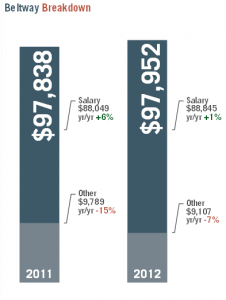
For those working stateside, data shows that Washington, D.C., Maryland and Virginia are home to the highest average compensated workers. Political leaders in the region have long attempted to concentrate the security clearance community in the Beltway, in much
the same way as Northern California has become home to microchip and Internet start-ups.
Security-cleared professionals working in the Capital region (D.C., Maryland and Virginia) earned on average $97,952, essentially flat from the previous year. While salaries increased one percent year/year on average to $88,845, the amount of other compensation fell slightly from $9,789 in 2011 to $9,107.
While it has always paid to be security-cleared and near the seat of government, the compensation gulf between those in the D.C.-metro area and other parts of the U.S. is widening. In particular, compensation of security-cleared talent in Florida and California weighed down the overall compensation average. There are two prominent features of both markets: aerospace defense hubs and significant military installations.
Aerospace programs with high costs and budget overruns are most at risk for funding cuts, and these results indicated consistent and valid concerns around contract losses. Including returning military troops, Florida’s security-cleared professionals’ compensation dropped overall eight percent to $75,657 year/year. Likewise, there was a five percent year/year decline in security-cleared compensation in California to $83,440.
Security-cleared professionals working for defense contractors in California and Florida had sharp declines in average compensation, as well as in Texas and Alabama – two more states with significant aerospace defense programs. In Alabama, security-cleared earnings dropped six percent year/year to $80,691 and a similar impact was felt in Texas where security-cleared earnings declined two percent year/year to $72,142.
The aerospace industry’s workforce has been shrinking. A 2012 report from Deloitte, commissioned by the Aerospace Industry Association, found that the U.S. aerospace and defense industry employed about one million workers directly in 2010 (the last year available), down 52,223 jobs from 2008. While no comparable data is available for the last two years, Challenger, Gray and Christmas reports more than 50,000 job cuts have been announced in aerospace and defense during that time-frame.
ClearanceJobs.com identified 29 states and Washington D.C., with enough data from professionals currently employed and possessing active federal security clearance. The range of compensation varies greatly, from $58,839 earned on average in Kentucky, compared to $99,292 earned in the Virginia. For a state by state, look at security-cleared compensation, visit http://www.clearancejobs.com/salary.
The vast majority of survey respondents are based in the United States. But, foreign-based respondents accounted for about 10 percent of the study. For those crossing shores, the pay difference compared to those working stateside was noticeable. The average total compensation for those outside the U.S. was $132,244 in 2012, nearly $3,000 less than the previous year.
Security-cleared professionals serving in Afghanistan reported the highest total compensation, averaging $155,010, down from $158,885 the year before. Iraq was next, with workers in-country averaging $148,634 in total compensation, down sharply from $163,577 in 2011. Dropping closer to the six figure mark, earnings for security-cleared professionals in Qatar averaged $97,175 and in Germany compensation averaged $101,824.


